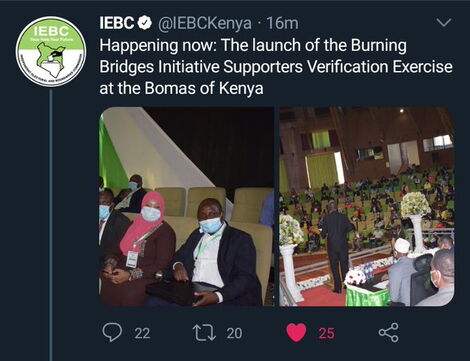The countdown to the Building Bridges Initiative (BBI) referendum gained momentum Wednesday with the launch of the signatures verification exercise by IEBC.
The Independent Electoral and Boundaries Commission (IEBC) Chairman, Mr Wafula Chebukati, on Wednesday, presided over the exercise to be conducted by 400 data verification clerks and at least 60 supervisors.
The clerks on Wednesday took a secrecy oath and are attending a one-day training before they start verification of the 4.4 million signatures tomorrow (Thursday).
The exercise is expected to take at least 40 days.
The Independent Electoral and Boundaries Commission (IEBC) has at the same time apologised for a tweet they put on December 30, 2020, that appeared to take a swipe at the Building Bridges Initiative (BBI).
“Earlier today, the Commission posted a tweet on the launch of the Verification of BBI supporters. However, there was a typographical error in the tweet which was made inadvertently. The error does NOT any in a way reflect the position of the Commission or its staff.
“The Commission sincerely apologizes to all its stakeholders and the General Public,” IEBC apologised.
The presumed error occurred as the commission intended to inform Kenyans of a training programme for 400 clerks selected for the verification of BBI signatures.

The commission has since deleted the message and was yet to offer an apology or explanation, as at the time of publishing this story.
Netizens were quick to take screenshots with the phrase “burning bridges” instantly going viral and one of the top trending topics on Twitter.
One million threshold
“Once the verification exercise is completed and the signatures meet the one million threshold, the Constitution of Kenya Amendment Bill will be taken to the county assemblies and they shall have three months to debate it and return their findings,” Mr Chebukati said at the Bomas of Kenya, where he launched the verification drive.
He went on: “It will then go to Parliament, then the quest for a referendum will be sent to us. When we finally get the request for a referendum, the commission has three months within which to have the vote.”
IEBC acting Chief Executive Officer Hussein Marjan said the 400 clerks will be working from the Bomas of Kenya.
“The 60 supervisors will be required to generate reports on (a) daily basis. Such that by the time we complete the exercise, the report will be ready. They’ll be putting up around here (Bomas) so that they work late and come here in the morning,” Mr Marjan said.
He said the Commission has provided accommodation for the 60 supervisors at Sh6,500 per day for the 40 days.
“We will also provide for stationery and PPE for the clerks and the supervisors,” he said.
The launch was also attended by the promoters of the initiative led by the BBI Secretariat co-chairman Dennis Waweru and IEBC Commissioners and staff.
After the verification of signatures, the IEBC will submit the Bill to the 47 county assemblies and the regional Houses will have three months within which to consider the Bill.
Murky
If more than half (24) pass the Bill, it will be introduced to the Senate and the National Assembly.
“A Bill to amend this Constitution shall not be called for second reading in either House within 90 days after the first reading of the Bill in that House,” the Constitution says.
This means the least time Parliament can take is 90 days, assuming all the other processes are cramped into one day after the immovable deadline between the first and second readings.
Then the timelines get murky from there.
The Constitution does not say how long Parliament should take, after passing the Bill, to pass it on to the President, or how long the President shall take once that Bill is on his desk.
It also does not state the period for the introduction of a draft Bill in Parliament upon approval by county assemblies.
Two committees of the National Assembly have been ordered by Speaker Justin Muturi to harmonise laws on the referendum in what is expected to guide these and other processes on the long road to overhauling the 2010 Constitution.
Legal experts have, however, in such cases, insisted that the process, if timelines are not stated, is guided by the principle of “reasonable timeline” in the supreme law.
Once the President passes his message to the IEBC to hold a referendum on the receipt of the Bill from Parliament, the commission has 90 days within which to hold a referendum.
Credit: Source link